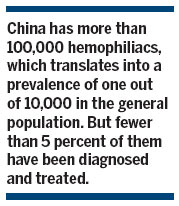Health
Lack of hemophilia treatment puts patients at risk
Updated: 2011-04-20 07:55
By Shan Juan (China Daily)
 |
Sun Shiran can't do physical education classes at his Beijing middle school and must avoid any intensive activities, because even a small wound could kill him.
The 15-year-old has had to frequently visit the hospital since he was diagnosed with hemophilia at age 6.
Hemophilia is an inherited blood disorder that usually affects only males, but is transmitted by women to their sons.
Hemophiliacs lack, or have an impairment of, certain blood-clotting agents, so an injury may cause fatal bleeding.
The incurable disease can be controlled with regular infusions of the clotting factor VIII.
Sun has been receiving two transfusions a week since the government introduced a new health insurance policy in 2008 that covers 70 percent of the medical costs. His family must still pay more than 3,000 yuan ($459.14) a month.
Before the new insurance, the boy received infusions only after bleeding episodes, because of the high cost, his mother Shi Tao says.
Experts estimate China has more than 100,000 hemophiliacs, which translates into a prevalence of one out of 10,000 in the general population. But fewer than 5 percent of them have been diagnosed and treated.
Untreated hemophilia can cause crippling pain, severe joint damage, disability and early death, according to the World Federation of Hemophilia.
Even diagnosed patients "face great challenges to receive treatment largely because of the high cost", says Professor Yang Renchi of the Institute of Hematology and Blood Diseases Hospital of the Chinese Academy of Medical Sciences. Yang made the comment at a recent event organized by Sohu, a major Chinese news portal.
Few can afford the lifelong treatment, which costs tens of thousands of yuan a month, without insurance, he says.
But medical bills from hemophilia treatment can be partially covered by insurance in only a handful of places in the country, including Shanghai and Beijing.
And supplies of the clotting factor VIII are insufficient to meet demand, due to a shortage of its raw material, blood plasma, Yang says.
Beijing Children's Hospital hematology specialist Wu Runhui says the lack of treatment means most Chinese patients become disabled and die young.
Sun's recurrent bleeding episodes have left his arm permanently damaged so that he cannot hold it straight.
The limb disability could have been prevented if he had received enough clotting factor VIII infusions when he was younger, his mother says.
The Chinese Ministry of Health has established a nationwide hemophilia patient registration system to diagnose more hemophiliacs and improve their medical care.
About 10,000 people have registered so far.
"The information and data collected from the system will help the government guide the production of clotting factor VIII and make relevant policies to support the patients," Yang says.
E-paper

Han me downs
Traditional 3,000-year-old clothes are making a comeback.
Reaching out
Fast growth fuels rise in super rich
Chinese tourists spend more
Specials

Big spenders
More mainland tourists are expected to spend money on overseas travel this year.

Rise in super rich
Report cites rising property prices, gdp as key drivers of increasing number of chinese millionaires.

Reaching out
Condom makers are stepping up their presence in smaller cities to boost sales
